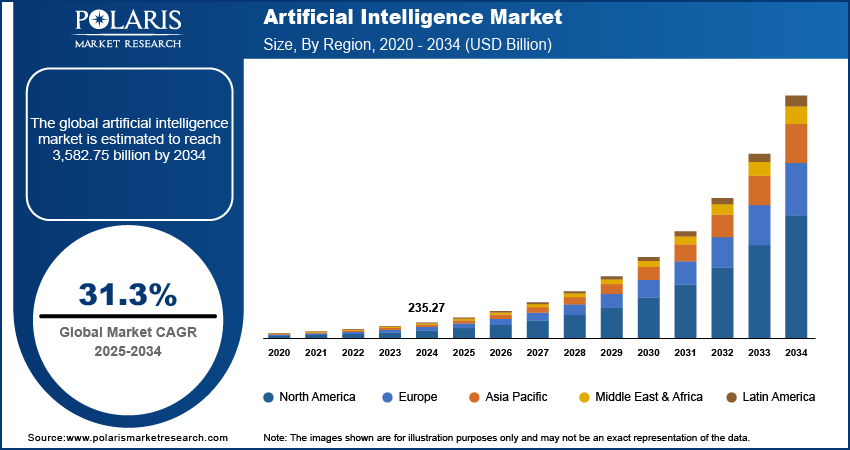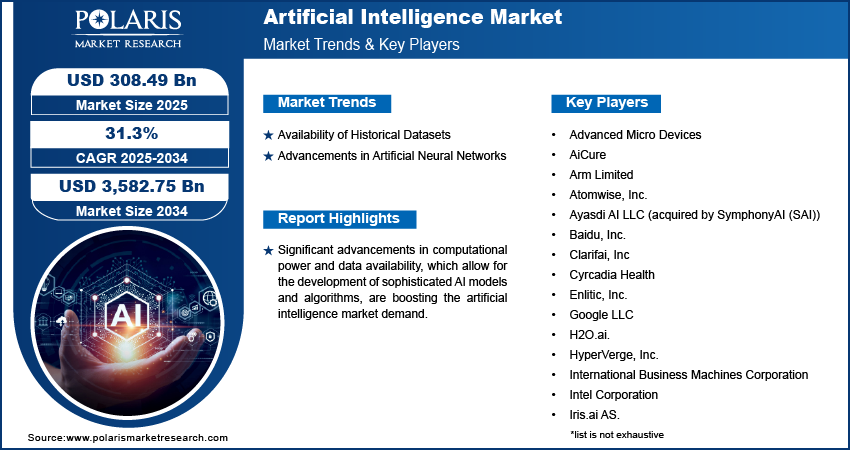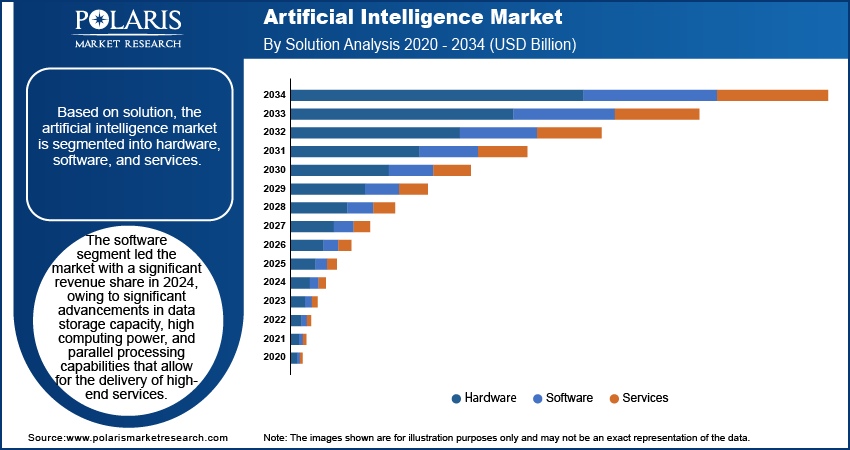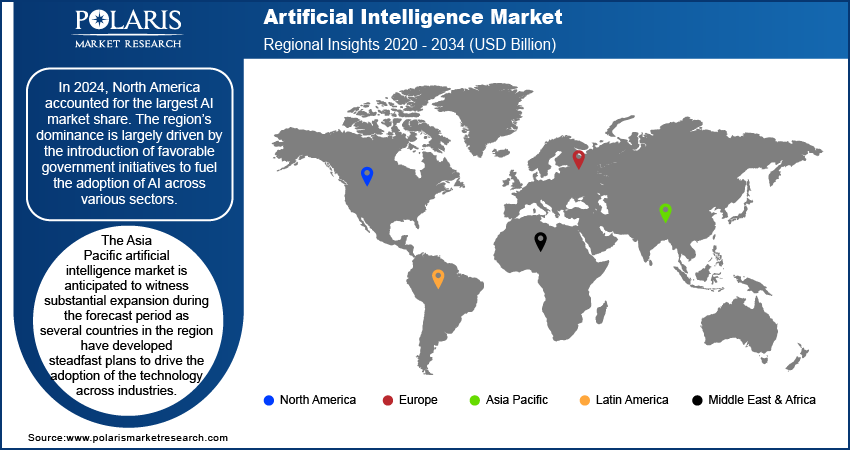
Artificial Intelligence Market Size, Share, Trends, Industry Analysis Report: By Solution (Hardware, Software, and Services), Technology (Deep Learning, Machine Learning, Natural Language Processing, Machine Vision, and Generative AI), Function, End-Use, and Region (North America, Europe, Asia Pacific, Latin America, and the Middle East & Africa) – Market Forecast, 2025–2034
- Published Date:Dec-2024
- Pages: 118
- Format: PDF
- Report ID: PM1081
- Base Year: 2024
- Historical Data: 2020-2023
Artificial Intelligence Market Overview
The global artificial intelligence market was valued at USD 235.27 billion in 2024. The market is projected to grow from USD 308.49 billion in 2025 to USD 3,582.75 billion by 2034. It is projected to exhibit a CAGR of 31.3% from 2025 to 2034.
Artificial intelligence (AI), frequently called machine intelligence, is a field of computer science that concentrates on advancing and managing technology that can learn to make choices and independently execute transactions on behalf of humans. AI is a broad field that draws from several disciplines, including computer science, statistics, neuroscience, and philosophy. Applications and devices equipped with AI have the potential to see and identify objects. Also, they can learn from new information and experience and make detailed recommendations to experts and users. AI systems are used in a diverse range of applications, including banking, virtual assistants, image recognition, and self-driving cars.

To Understand More About this Research: Request a Free Sample Report
Significant advancements in computational power and data availability, which allow for the development of sophisticated AI models and algorithms, are driving the artificial intelligence market demand. In addition, the continuous research and innovation by major technology companies are propelling the adoption of advanced technologies such as AI in industry verticals, including healthcare, retail, automotive, manufacturing, and finance. Human-AI collaboration, which has the potential to resolve the ethical challenges that come with AI, is anticipated to be the key artificial intelligence market trend during the forecast period. The growing digitalization and internet penetration worldwide are expected to provide lucrative opportunities for market growth.
Artificial Intelligence Market Drivers
Availability of Historical Datasets
The accessibility to historical datasets has accelerated the rate of innovation in artificial intelligence. As data storage and recovery become more economical, government agencies and healthcare institutions are building unstructured datasets that are accessible to the research domain. Researchers now have access to high-quality datasets, ranging from clinical imaging to historic weather patterns. The next-generation computing architectures, with access to these rich datasets, are inspiring researchers and information scientists to innovate speedily. Thus, the rapid innovation led by the availability of high-quality datasets is driving the artificial intelligence market growth.
Advancements in Artificial Neural Networks
Advancements in deep learning and artificial neural networks (ANNs) have fueled the adoption of AI across several sectors, such as manufacturing, automotive, healthcare, and aerospace. ANNs are developed to recognize similar patterns and provide tailored solutions. They are substituting traditional machine learning systems to develop accurate and precise versions. For instance, recent advancements in computer vision techniques, such as Generative Adversarial Networks (GAN) and Single Shot MultiBox Detector (SSD), have resulted in significant progress in digital image processing techniques. With these techniques, videos and images taken in low resolution or low light can be modified into HD quality. Also, they have laid the foundation for digital image processing in sectors such as surveillance and security, healthcare, and transportation. Such emerging machine learning methods fundamentally transform how artificial intelligence versions are deployed and trained. Thus, the advancements in ANNs boost the artificial intelligence market expansion.

Artificial Intelligence Market Segment Insights
Artificial Intelligence Market Insights by Solution
The artificial intelligence market segmentation, based on solution, includes hardware, software, and services. The software segment led the market with a significant revenue share of 34.5% in 2024. The software segment’s leading share is attributed to significant advancements in data storage capacity, high computing power, and parallel processing capabilities that allow for the delivery of high-end services. Also, the ability to extract information, offer real-time insights, and help in decision-making has positioned this segment to garner a significant share of the market. Besides, the growing need for companies to comprehend and analyze visual content to obtain meaningful insights is anticipated to propel the adoption of artificial intelligence software from 2025 to 2034.
Artificial Intelligence Market Insights by Function
The artificial intelligence market, by function, is segmented into cybersecurity, finance and accounting, human resource management, legal and compliance, operations, sales and marketing, and supply chain management. The sales and marketing segment is anticipated to register the highest CAGR during the forecast period. The segment leverages AI to transform the way businesses attract and retain consumers. With AI adoption, businesses can analyze vast amounts of consumer information to identify high-potential leads, personalize marketing messages, and prioritize sales efforts. AI-powered chatbots can answer customer queries, schedule appointments, and even qualify leads, freeing up sales professionals for other complex tasks. Besides, AI can offer personalized recommendations by analyzing the customer’s online behavior and buying history, resulting in more effective campaigns that drive sales.

Artificial Intelligence Market Outlook by Regional Insights
By region, the study offers artificial intelligence market insights into North America, Europe, Asia Pacific, Latin America, and the Middle East & Africa. In 2024, North America accounted for a sizable portion of the market share. The regional market’s dominance can be attributed to the introduction of favorable government initiatives to drive the adoption of AI across various sectors. Governments across North America are making significant investments in AI research and development, as well as funding AI-related projects. In addition, they are utilizing AI in several fields, such as promoting healthcare innovation and improving public safety and transportation.
The Asia Pacific artificial intelligence market is anticipated to experience substantial expansion during the forecast period. Several countries in the region have developed steadfast plans to drive the adoption of the technology across industries. Also, the region’s AI use cases are anticipated to rise as 5G technology is increasingly implemented in countries such as Japan, South Korea, India, China, and Singapore. For instance, initiatives such as Singapore’s National AI Strategy, China’s Next Generation Artificial Intelligence Development Plan, and Japan’s Society 5.0 Vision are propelling the AI market growth in the region.

Artificial Intelligence Market – Key Players and Competitive Insights
The top players in the AI market are focusing on research and development to enhance their products and services offerings and drive market demand. Besides, they are adopting various strategic initiatives, including collaborations, new product launches, and increased investments, to improve their global footprint. To expand and survive in a more competitive environment, the artificial intelligence market players must offer innovative solutions.
In recent years, the artificial intelligence market has witnessed several technological and innovation breakthroughs, with key players seeking to provide advanced solutions that help meet sustainability goals. A few prominent players in the market are Advanced Micro Devices; AiCure; Arm Limited; Atomwise, Inc.; Ayasdi AI LLC (acquired by SymphonyAI (SAI)); Baidu, Inc.; Clarifai, Inc; Cyrcadia Health; Enlitic, Inc.; Google LLC; H2O.ai.; HyperVerge, Inc.; International Business Machines Corporation; Intel Corporation; Iris.ai AS.; Lifegraph; Microsoft; NVIDIA Corporation; Sensely, Inc.; and Zebra Medical Vision, Inc.
List of Key Players in Artificial Intelligence Market
- Advanced Micro Devices
- AiCure
- Arm Limited
- Atomwise, Inc.
- Ayasdi AI LLC [acquired by SymphonyAI (SAI)]
- Baidu, Inc.
- Clarifai, Inc
- Cyrcadia Health
- Enlitic, Inc.
- Google LLC
- H2O.ai.
- HyperVerge, Inc.
- International Business Machines Corporation
- Intel Corporation
- Iris.ai AS.
- Lifegraph
- Microsoft
- NVIDIA Corporation
- Sensely, Inc.
- Zebra Medical Vision, Inc.
Artificial Intelligence Industry Developments
March 2024: Microsoft announced the expansion of its collaboration with NVIDIA to accelerate innovation in the healthcare and life sciences industry. According to Microsoft, the collaboration will leverage the advanced compounding capabilities of Microsoft Azure and NVIDIA's DGX Cloud and Clara suite to help life sciences and healthcare organizations harness the power of generative AI and improve patient care.
January 2024: Google introduced its new AI-based text-to-video diffusion model, Lumiere. The new model can take text descriptions to generate short video clips. Also, it can animate still images or give a specific style to video generation.
Artificial Intelligence Market Segmentation
By Solution Outlook
- Hardware
- Accelerators
- Processors
- Memory
- Network
- Software
- Services
- Professional
- Managed
By Technology Outlook
- Deep Learning
- Machine Learning
- Natural Language Processing (NLP)
- Machine Vision
- Generative AI
By Function Outlook
- Cybersecurity
- Finance and Accounting
- Human Resource Management
- Legal and Compliance
- Operations
- Sales and Marketing
- Supply Chain Management
By End-Use Outlook
- Healthcare
- Robot Assisted Surgery
- Virtual Nursing Assistants
- Hospital Workflow Management
- Dosage Error Reduction
- Clinical Trial Participant Identifier
- Preliminary Diagnosis
- Automated Image Diagnosis
- BFSI
- Risk Assessment
- Financial Analysis/Research
- Investment/Portfolio Management
- Others
- Law
- Retail
- Advertising & Media
- Automotive & Transportation
- Agriculture
- Manufacturing
- Others
By Regional Outlook
- North America
- US
- Canada
- Europe
- Germany
- France
- UK
- Italy
- Spain
- Netherlands
- Russia
- Rest of Europe
- Asia Pacific
- China
- Japan
- India
- Malaysia
- South Korea
- Indonesia
- Australia
- Rest of Asia Pacific
- Middle East & Africa
- Saudi Arabia
- UAE
- Israel
- South Africa
- Rest of the Middle East & Africa
- Latin America
- Mexico
- Brazil
- Argentina
- Rest of Latin America
Artificial Intelligence Market Report Scope
|
Report Attributes |
Details |
|
Market Size Value in 2024 |
USD 235.27 billion |
|
Market Size Value in 2025 |
USD 308.49 billion |
|
Revenue Forecast by 2034 |
USD 3,582.75 billion |
|
CAGR |
31.3% from 2025 to 2034 |
|
Base Year |
2020 |
|
Historical Data |
2020–2023 |
|
Forecast Period |
2025–2034 |
|
Quantitative Units |
Revenue in USD billion and CAGR from 2025 to 2034 |
|
Report Coverage |
Revenue Forecast, Market Competitive Landscape, Growth Factors, and Trends |
|
Segments Covered |
|
|
Regional Scope |
|
|
Competitive Landscape |
|
|
Report Format |
|
|
Customization |
Report customization as per your requirements with respect to countries, regions, and segmentation. |
FAQ's
The artificial intelligence market size was valued at USD 235.27 billion in 2024 and is projected to grow to USD 3,582.75 billion by 2034.
The market is projected to register a CAGR of 31.3% from 2025 to 2032.
North America held the largest AI market share in 2024.
A few key AI market players are Advanced Micro Devices; AiCure; Arm Limited; Atomwise, Inc.; Ayasdi AI LLC (acquired by SymphonyAI (SAI)); Baidu, Inc.; Clarifai, Inc; Cyrcadia Health; Enlitic, Inc.; Google LLC; H2O.ai.; HyperVerge, Inc.; International Business Machines Corporation; Intel Corporation; Iris.ai AS.; Lifegraph; Microsoft; NVIDIA Corporation; Sensely, Inc.; and Zebra Medical Vision, Inc.
The software segment accounted for the largest market share in 2024.
The sales and marketing segment is anticipated to register the highest CAGR from 2025 to 2034.
